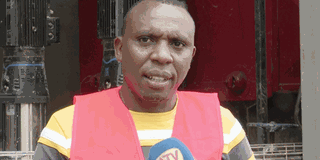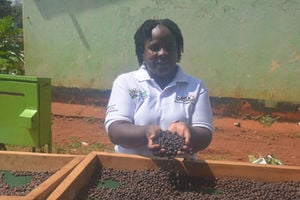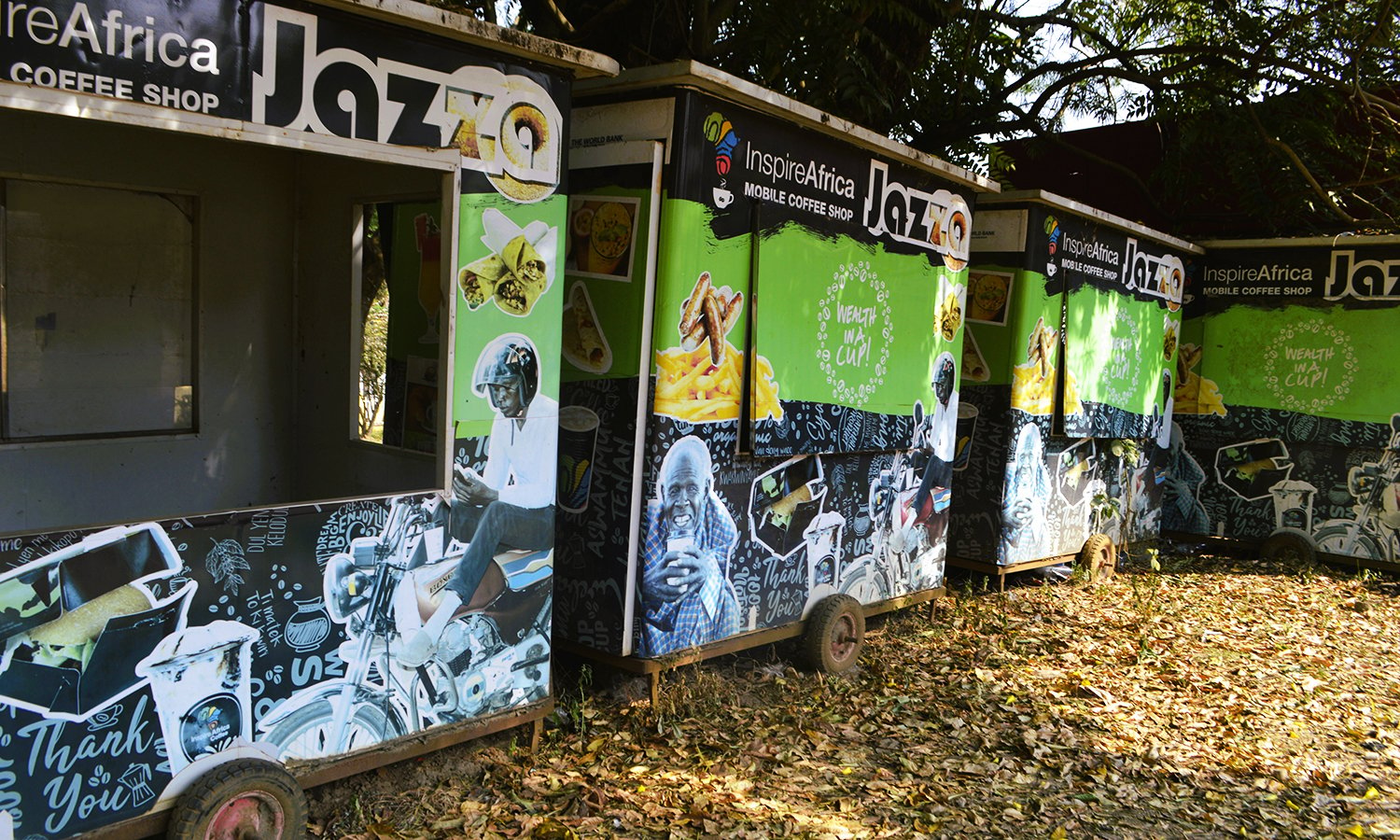
Nelson Tugume, the proprietor of Inspire Africa during an interview. PHOTO/COLLINS MUHWEZI
Mr Nelson Tugume’s judgment in pursuing goals positions him as a shrewd businessman, even among his critics. But that is something the chief executive officer of Inspire Africa Coffee has come to terms with.
“My work is to focus on the ball, and create wealth as an entrepreneur. That’s what keeps me awake at night,” Tugume says.
Mr Tugume, a graduate of IT and Computer Science, ended up in the coffee value addition business after noticing how his mother, the producer of the valuable bean, is being ripped off along the value chain.
While in the US on a visit to the White House after being selected as one of the Young Achievers Winner, 2011 Mr Tugume mistakenly bought Ugandan coffee at $79 (Shs293,545) a pack. When he got home, her mother told her she gets paid Shs4,200 per kg – way below the grams that cost him nearly $80 (Shs297,261). He was angry. And that kickstarted his value addition coffee story.
With an estimated $200 million (about Shs743billion) worth of coffee value-added imports making into the county every year, Mr Tugume whose objective alongside likeminded, is not only to reverse this trend through import substitution but also see to it that Uganda becomes a coffee export hub for the world.
This explains why the Coffee Value Chain Development programme has been offered Shs75 billion in the budget to improve coffee value chain development.
Part of the deal involves the government partnering with the private sector like Mr Tugume to fast-track local value addition to coffee.
According to the 2024/25 Budget Speech, three centres for high-value coffee processing under the Coffee Investment Consortium, Great Lakes Coffee, and Inspire Africa Coffee are already being implemented.
Modern roastery, freeze-dry, and spray-dry technologies to produce instant coffee have all been acquired. Other facilities for roasting and grinding coffee products, coffee capsules, cold brew, and instant coffee have also been procured. Once up and running, a total capacity of 5,850 metric tonnes per year will be generated.
In addition to completing and expanding these facilities, the government will support their operationalisation and market penetration of the products in the local, regional, and international markets.

A farmer in Bunyangabu spreads out coffee beans. BY MICHAEL KAKUMIRIZI
The target is to aggregate, add value, and market at least 1 million bags of medium-to-high-quality green coffee beans by 2025. This will earn Uganda $560 million from value-added coffee in the next five years, which, the Finance ministry believes would catalyse the whole sector to bring in at least $5 billion in line with the government's tenfold growth strategy targeting to expand the size of the economy from about $50 billion last year to $ 500 billion by 2040.
But coffee exporters must comply with the new European Union deforestation regulation that coffee planted on deforested land after December 2020 will not access the EU market.
“There is a directive by the European Union that all coffee exported to the EU must have been grown from a land that has not been forested for at least two years. The assumption is that we perpetuate deforestation which is not entirely true. Players in the coffee sector need to be mindful of this requirement or else it will badly impact the sector if this narrative is not countered,” Ms Jane Nalunga, trade and investment analyst, said.
Coffee tourism
In five years, Uganda has doubled its coffee earnings to about a billion dollars. In 2023/24 alone, coffee exports were 6.13 million bags valued at $ 1.144 billion in 2023/24. This was an increase of 6 percent in volume and 35 in value compared to Financial Year 2022/23 when exports were 5.8 million bags valued at $846 million.
Currently, farmers are earning the highest prices in 30 years, generating revenue of Shs82 billion last financial year as Uganda bean maintains its high demand in global coffee markets for its quality. According to the Uganda Coffee Development Authority (UCDA), coffee exports in July set a record of 821, 593 bags valued at $210.48 million (about Shs780 billion) - the highest volume ever exported in a month.
With the current trajectory, the Coffee Roadmap target of 20 million 60 kg bags produced by 2030 looks achievable. At the same time the roadmap signed by President Yoweri Kaguta Museveni in 2017, setting a target for foreign exchange earnings of $1.5 billion annually from the $20 million bags seems within reach with the current trend.
But is this something to celebrate?
Mr Tugume believes this figure can be grown fivefold and he is looking to be a key contributor in this endevour.
First, he hopes to turn Ntungamo, a district in Western Uganda, into a coffee park. Here is his plan.
With Uganda increasingly becoming one of the top 10 best tourism destinations in global tourism rankings, Mr Tugume smells an opportunity that he is looking to cash in on.
Last year, international tourist arrivals increased by 56 percent to 1.274 million tourists compared to 814,085 arrivals in 2022 and the peak of 1.52 million in 2019, fetching $1.03 billion in foreign exchange earnings for the country.
If you only get 500, 000 tourists coming on coffee tours and make sure you do the right thing and every tourist is spending 2,000 dollars then you can immediately get $2 billion. Out of only coffee tourism.
“You need half of the tourists coming into the country to buy just two kilos of our coffee at $40 per Kg. With that we would have equalized the $200 million imports making into our economy,” he told Prosper Magazine during a tour of the Inspire Coffee facility in Ntungamo district last month.
He continued: “If we can have only 10 percent of those who bought our coffee refer to it as the best to their relatives and friends, then that would be equivalent to a marketing value worth more than Shs5 billion. That is what I am looking to achieve.”
Disruption
This will take some disruption, not necessarily technological, but mindset. For the last 100 years, he says, the focus has been on the production of coffee – which is a good thing. Now there should be a shift in investment in value addition.
“I am not talking about coffee grading and colour sorting, developing the coffee cosmetics industry, coffee park where coffee ice creams, coffee body scrubs, cold coffee brews, iced coffee, and malt drinks will be part of the menu in addition to other products resulting from coffee value addition.
While in Ntungamo, you can connect to Queen Elizabeth National Park in one hour. The same applies to Bwindi or Bunyonyi or Mburo National Park. The plan is to add a tourism circuit to our national park. You can spend some time here without worrying about getting to the other parks because you are just an hour away!
This will be in addition to our flagship unique instant coffee which is currently most marketable globally yet being monopolised by only Colombia, Brazil, and Vietnam. Yet Uganda can be part of the party and aim to partake in the nearly $150 billion instant coffee retail market.
Coffee in Ntungamo!
The small matter of growing coffee in Ntungamo, traditionally not known for being a place for growing the beans, came up. That, he says, should not be a problem, arguing that Ntungamo is one of the areas with the potential to grow some of the best coffees in the country because of its location between Kigezi, Rwenzori and the greater Ankole.

Inspire Coffee Africa factory under construction in Ntungamo District. PHOTO/COLLINS MUHWEZI
Importantly, the location should not make it impossible to become a coffee hub. “If you can send your coffee to Britain, Europe, and the United States of America and all over the world, why should it be difficult to send it in Ntungamo using a truck at only eight shillings per kg?” he asked.
The good news, however, is Inspire Africa Coffee has expansion plans including establishing presence in parts of central regions, the Elgon region, West Nile and the Rwenzori.
Financing
So far, investment injected in Inspire Africa coffee is in the range of $32 million. Because of the nature of the enterprise, requiring intensive investment, the firm is open to having a co-financier to pull off the lucrative but high investment facility.
“We need more than $65 million to be able to run without any qualms. As for policies that will not help him achieve his goal of investing another $110 million over the next five years is a bad deal for a job creator like him.
Inspire Africa Coffee hopes to process at least 10,000 metric tonnes for the start with a view to reach 50,000 metric tonnes in the next five years.
Farmers will accrue an average of $4 a kilo and look to directly employ over 800 young people and expatriates across professional backgrounds. So, by October or November, we should start churning out some of our 14 product lines for our coffee park innovation.
Speaking about his relationship with President Museveni, he says they are connected because of their love for coffee value addition.




